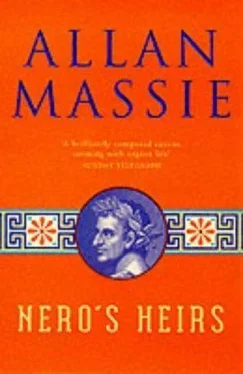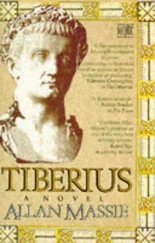Allan Massie - Nero_s Heirs
Здесь есть возможность читать онлайн «Allan Massie - Nero_s Heirs» весь текст электронной книги совершенно бесплатно (целиком полную версию без сокращений). В некоторых случаях можно слушать аудио, скачать через торрент в формате fb2 и присутствует краткое содержание. Жанр: Исторические приключения, на английском языке. Описание произведения, (предисловие) а так же отзывы посетителей доступны на портале библиотеки ЛибКат.
- Название:Nero_s Heirs
- Автор:
- Жанр:
- Год:неизвестен
- ISBN:нет данных
- Рейтинг книги:3 / 5. Голосов: 1
-
Избранное:Добавить в избранное
- Отзывы:
-
Ваша оценка:
- 60
- 1
- 2
- 3
- 4
- 5
Nero_s Heirs: краткое содержание, описание и аннотация
Предлагаем к чтению аннотацию, описание, краткое содержание или предисловие (зависит от того, что написал сам автор книги «Nero_s Heirs»). Если вы не нашли необходимую информацию о книге — напишите в комментариях, мы постараемся отыскать её.
Nero_s Heirs — читать онлайн бесплатно полную книгу (весь текст) целиком
Ниже представлен текст книги, разбитый по страницам. Система сохранения места последней прочитанной страницы, позволяет с удобством читать онлайн бесплатно книгу «Nero_s Heirs», без необходимости каждый раз заново искать на чём Вы остановились. Поставьте закладку, и сможете в любой момент перейти на страницу, на которой закончили чтение.
Интервал:
Закладка:
Allan Massie
Nero's Heirs
I
To C. Cornelius Tacitus, Senator:
I confess that I do not know whether I am more honoured or more amazed: that you, the distinguished author of the Dialogue on Oratory, and of the ever to be admired Life of your father-in-law, the Imperator C. Julius Agricola, should turn to me and request my help in preparing the materials for the History of our own terrible times, on which you tell me you have audaciously embarked.
What can I say? I cannot deny you, all the less because I am persuaded that your History will be immortal, and this makes me all the more anxious that my name should be, however vestigially, associated with it. And yet I shrink from the task you set me, in part because I am conscious of my own inadequacy, in part because the thought of venturing into the gloomy cave of memory fills me with fear, foreboding, and self-hatred. I, like all our generation, have waded deep in innocent blood. The cries of those dragged to prison and execution still ring in my disturbed and fearful nights. And I do not know if I can summon the fortitude to set down for you what I recall – still less what I was guilty of – in the time of terror.
You know this yourself, being, as I remember, a man of lively and sympathetic imagination – the source which feeds your genius. Yet you ask this of me, and such is my respect for you that, as I say, I cannot deny you, though every fibre of my nervous being cries out to me to do so. Even the particular reason why you seek my help makes me shudder. You do not state this reason, but I know it is in your mind. I was indeed the schoolfellow, and for some years the dearest friend, perhaps the only friend, of the tyrant Domitian. I knew, if any did, the innermost thoughts of that dark and secret man. We were brought up together, my own (reputed) father having been killed at the side of his father Vespasian in some scuffle with barbarians in the British campaign. Vespasian himself often spoke warmly of my father, and even let me understand that he owed his life to him. Perhaps he did; why say so otherwise? Then I was with Domitian throughout that terrible year when Rome stumbled and seemed about to be engulfed in civil disaster.
Oh, yes, I know it well. I know too much. I learned, when too young for such knowledge, that the gods take no thought for our happiness, but only for our punishment.
You tell me it is now safe for me to return to Rome, the tyrant being no more. I knew it already. It is not fear that keeps me here, in this distant town on the edge of barbarian lands, far from where the lemon trees bloom. It is rather a species of lassitude. Why should I move? I have made a sort of life for myself. The wine is thin and often sour, but there is no shortage of it. I confess I often go drunk to bed; drunkenness wards off evil dreams. And I have a woman, part-Greek, part-Scythian, who loves me, or says she loves me, and at any rate acts often as if she did. We have children, too, four curly-headed brats. What would the like of them do in Rome? What could Rome do for them? Here they will grow to be farmers or traders, useful creatures.
Tacitus, you who have survived and continued to inhabit the Great World, and engage in public affairs, will no doubt despise me and my way of life. But you have survived by grace of qualities which I lack, perhaps by grace of virtue also (though in our time virtue has too often invited punishment) and, it may be, by a touch of Fortune also. It occurs to me that you are a favourite of the gods, if such a thing is possible. But I have too much with which to reproach myself. I have acquiesced in murder and, for a time, profited by my weakness. I was ambitious, and, to further my ambition, stood by while evil was done.
You ask me to revisit scenes of bloodshed, to re-enter a world of treachery and malice, to confront the stuff of nightmare. You do not know what you ask of me; it is to explore memory to destroy such peace as I now possess.
Nevertheless I shall do as you ask. There will be at least one former friend whom I have served well.
II
You ask me, my dear Cornelius Tacitus, for my first memories of Domitian. Your request is impossible to satisfy, for this reason: that I cannot recall any period of my life from which Domitian was absent.
As you know, his father, the now-glorious-in-memory Emperor Vespasian, was a man of no particular birth or early renown. He was born, when the Divine Augustus was still Princeps, at Reiti in the Sabine Hills, and was brought up by his grandmother who had a small farm at Cosa. I think his father was a tax-collector employed in Asia, but I may be mistaken here. Of course, when Domitian, or indeed his brother Titus, still lived, it would have been unwise to expatiate on Vespasian's humble origins, though the man himself never troubled to hide them. Now, since you are writing a truthful history, it is as well to be clear on the matter: the family was of no significance.
I can say this because as you know it was not so in my case. Or rather, as you think you know. My own birth was as distinguished as could be. My mother belonged to the Claudian gens, and so was connected by cousinship with the imperial family itself. My father could boast numerous consuls among his Aemilian ancestors. I belonged by birth to the highest aristocracy of Rome. It seems amusing to me now, in my present circumstances.
But now, since nothing matters to me any more, I can confess to you what pride has throughout my life compelled me to conceal: that M. Aemilius Scaurus, himself son of that Scaurus who held a consulship under Tiberius, was my father only in law and not in actuality. A peevish effeminate man, whose lust for wealth and office far surpassed his ability, he acquiesced with a contemptible complacency in the seduction of his wife, my noble mother, by Narcissus. Do I need to remind you that he was the freedman who swayed the judgement of the feeble Emperor Claudius, was said, indeed, to have controlled him; he also commanded the detachment of the Praetorian Guard which arrested and put to death the Emperor's third wife Messalina, notorious (as you will recall) for her flagrant immorality.
I have no doubt, my friend, that you, with your stern, if antique, ideas of Republican virtue, both deplore and despise Narcissus and all that he represented. I shall take no issue with you there; beyond remarking that he was evidently a man of some capacity. Now that, in exile, I care nothing for lineage, I can say what I would once have been ashamed to utter: that I find more satisfaction in being in reality the son of the capable, though ruthless and corrupt, Narcissus than of the feeble Scaurus whose name I bear and of whose ancestors I used to boast.
Of course I didn't for years know my true paternity. My mother – a woman of strong character – burst out with it in one of our many quarrels. I have no doubt that she spoke the truth, if only because Narcissus was long dead by then, and rumours of her association with him could have brought her nothing but disgrace. Her admission gave me a weapon, which subsequently I did not scruple to use against her. She was stern, harsh-judging woman. Yet I adored her in youth when her beauty seemed to me to rival that of Venus herself.
You will understand the relevance of my confession to your inquiry, for you must know that it was by the patronage of Narcissus that Vespasian rose from obscurity, obtaining first the command of a legion, then sharing the glory of the conquest of Britain, where he subdued the whole Island of Wight, subsequently being rewarded with triumphal decorations and a consulship. Without Narcissus, Vespasian would, in his middle forties, have been a retired officer of no consequence, subsisting on half-pay, and farming on a contemptibly small scale. It is indeed not by merit alone that men rise in our degenerate world!
Читать дальшеИнтервал:
Закладка:
Похожие книги на «Nero_s Heirs»
Представляем Вашему вниманию похожие книги на «Nero_s Heirs» списком для выбора. Мы отобрали схожую по названию и смыслу литературу в надежде предоставить читателям больше вариантов отыскать новые, интересные, ещё непрочитанные произведения.
Обсуждение, отзывы о книге «Nero_s Heirs» и просто собственные мнения читателей. Оставьте ваши комментарии, напишите, что Вы думаете о произведении, его смысле или главных героях. Укажите что конкретно понравилось, а что нет, и почему Вы так считаете.












